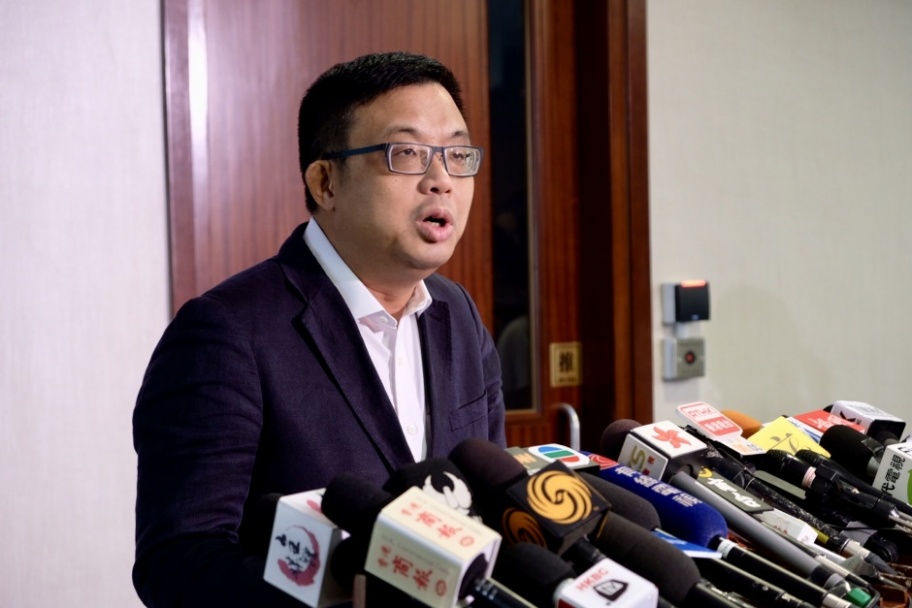The case of Chan Tong-kai, which has slumbered in obscurity since last February, has ignited a small political and legal explosion.
Mr Chan was arrested after his girlfriend died in what we used to call “suspicious circumstances” while the couple were on holiday in Taiwan. He hastened back to Hong Kong before this was discovered and the Taiwan police would now like him, as we also used to say, “to help with their inquiries”.

To this end they have asked for him to be sent back to Taiwan. Mr Chan was promptly arrested and charged with some rather technical offences which can be seen as having taken place in Hong Kong. He cannot be tried in Hong Kong for murder, or indeed for any other crime he may be suspected of committing in Taiwan, because the Hong Kong courts have no jurisdiction outside the territory.
Normally you would expect Mr Chan to be extradited to the place where his alleged crime was committed. But this is tricky. Hong Kong has extradition agreements with 20 countries, including Australia, the US and UK. China is not one of them. Taiwan is, of course, not mentioned at all.
The Fugitive Offenders Ordinance, which governs such matters, specifically excludes any such arrangement with the People’s Republic of China. I don’t know why the Mutual Legal Assistance on Criminal Matters Ordinance comes up in this context, because it does not cover the surrender of suspects, but it excludes China also.
Why these exceptions were made is not clear, but both ordinances were extensively amended in 1999 so we must suppose that this problem is not just an overlooked colonial relic.

Anyway it appears to be generally agreed that there is no present routine legal arrangement under which Mr Chan can be sent to Taiwan against his wishes. It seems that there is no limit either to the time he can be kept tangled up in Hong Kong’s legal machinery while the Security Bureau ponders the problem.
It appears from reports of the matter that the Bureau does have a recourse in cases like this: it can make a one-off request, which has to be scrutinised by the Legislative Council. I can find no trace of this procedure in either of the ordinances. Perhaps it is somewhere else.
The Bureau says, though, that this is “operationally impracticable” because the council’s proceedings are public. So the proposed deportee would hear of the matter and flee before his deportation was authorised.
This may be a problem in some cases, but certainly not in that of Mr Chan, who is safely ensconced in the bosom of the Correctional Services Department and is not going to flee anywhere.
So what is going on here? Well, suspiciously, the Bureau now wishes to extend the procedure in the Fugitive Offenders Ordinance to Taiwan. Since we must not mistake Taiwan for a separate country, however much it looks like one that will involve extending it to Macau and the People’s Paradise as well.
Cue political row. Clearly, this could lead to people being sent to the mainland against their wishes. Hong Kong people, as lawmaker Claudia Mo put it delicately, “lack confidence in the mainland judicial system.”
Democrat James To observed that having the Chief Executive as the person who triggered requests for surrender would result in pressure on that official to send people to China for trial for things done in Hong Kong and not crimes here. Everyone mentioned booksellers.

For the Government, we have Federation of Trade Unions’ Chairman Stanley Ng, a deputy to the National People’s Congress, complaining that critics were seeing “reds under the bed”, an interesting thing to say in this context where the reds are not so much under the bed as all over the room. More coherently he complained that people were “politicising the amendment with conspiracy theories.”
Holden Chow, for the DAB party, said that human rights would be preserved because the extradition request would have to be accepted by a court, and the proposed deportee would have the right to appeal. This is not entirely true.
The application to the Chief Executive and the imprisonment of the deportee are done “ex parte”, meaning the victim of the proceedings is not heard until later. In the meantime, he or she is in custody, and stays that way during the appeals, if any. If the last appeal succeeds, which could take years, the right to personal freedom has been infringed in a major way.
If the famous Ms Meng spends the next three years under house arrest in Canada and is eventually allowed to go home I imagine Mr Chow will get this point.
Alas, the Standard did not tell us which of the pro-establishment legislators perpetrated the hilarious idea that “the mainland legal system is not worse than that of the SAR”. It did, however, offer a creative approach from columnist Mary Ma.
Ms Ma said that there was no need to worry about China abusing the proposed extradition procedure because if China wanted to put someone who was in Hong Kong on trial, it could just kidnap them as it had done with Xiao Junhua, who has not been heard from since he was grabbed from a Hong Kong hotel in 2017.

This seems rather like saying that you should not lock your car because if anyone really wants to steal your radio he will break the window.
Are we witnessing a politically tone-deaf government treading in a nest of worms by accident? Or is it all a cunning plot to subvert Hong Kong’s legal autonomy and allow the Panda People to posture about Taiwan?
Suspicions are bound to arise because – as Ms Ma, sundry democrats and the Civic Party spokesman all agreed – there is an obvious solution to the immediate problem, which is to have an extradition agreement specifically with Taiwan alone.
Is that idea too easy?
